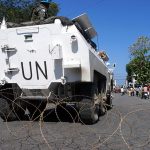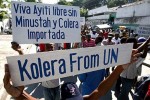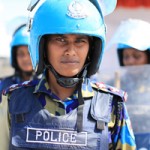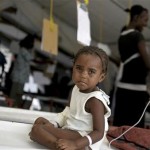Remove the Occupation Forces from Haiti | Retirar las fuerzas de ocupación de Haití
By Raúl Zibechi
SURda (Spanish)
English | Spanish
Translated from the Spanish by Dady Chery for Haiti Chery
This week, Haiti’s Senate declared itself unanimously for withdrawing all occupation troops from the United Nations Mission for Stabilization in Haiti (MINUSTAH) starting in October 15, 2012. A second resolution called for the mission to make reparations for over 6,200 cases of cholera and hundreds of sexual assaults.
This resolution, which is not binding on the executive branch, was adopted in a context of full political and social crisis, with daily demonstrations against MINUSTAH’s presence. Images broadcast on youtube.com of Uruguayan soldiers raping a Haitian teenager occasioned a wave of protests by students who expressed the rejection of the occupation troops by Haitian society.
Those in charge of the mission, especially the Brazilian government, have opted for a gradual withdrawal from the island, which implies a tacit recognition of the mission’s total failure. MINUSTAH includes more than 12,000 soldiers and police, 40 percent of whom come from nine Latin American countries, most of these with governments that regard themselves as progressive. The two largest contingents, with over a thousand uniformed men each, belong to Brazil, which heads the mission, and to Uruguay.
Although Uruguayan President José Mujica apologized to the Haitian government, he said that what happened was an isolated incident. However, the National Center for the Defense of Human Rights issued a report on September 4th that detailed dozens of abuses against the population by peacekeepers since they arrived on the island in June 2004, after the French-American invasion that overthrew legitimate president Jean-Bertrand Aristide.
As ever, the five Uruguayan soldiers were tried in their country and not in Haiti, since UN peacekeepers are above the law in Haiti. Other cases of rapes, killings, and attacks, including that of Haitian police, remain unpunished.
A recent paper by two Haitian sociologists and activists, Michaëlle Desrosiers and Franck Seguy, says that the UN mission uses rape as weapon of war with which it humiliates and exploits the most peaceful, with whom the only contact is meant to guarantee survival, simply because they are poor.
The work points out the differences between the 1915-1934 occupation of Haiti by the United States and the current occupation by troops led by progressive governments. On the former occasion, repression fell on blacks and mulattos, rich and poor, and this led to the formation of a broad cross-class social front against the occupation. Now things are more subtle and, according to the new global times, the invaders repress almost exclusively the poorest, to guarantee their legitimacy with the Haitian bourgeoisie and petty bourgeoisie, who recruit the bulk of its local civilian personnel.
These reflections by two Haitians shed some light on a carefully concealed piece of information about those who run MINUSTAH: the mission is part of the war against the poor, who are called by various names (the best known one being war on terror), that is militarizing the farthest reaches the world. The Brazilian military now says out loud that the same tactics tested in slums like Cité Soleil, defined as no-go zones, will be used in the favelas of Rio de Janeiro.
It is therefore urgent that MINUSTAH leaves Haiti. With every passing day, the blue helmets become worse in their racist and sexist oppression of the people and brutally repress any popular mobilization, as occurred against the barracks of Port Salut, from which the rapists fled to take refuge in Uruguay.
So far Brazil’s justification for the mission has been that it wanted to earn international legitimacy for its claim of a permanent seat on the Security Council of the UN. Uruguay’s reasons were much more mundane, such as the receipt of funds equivalent to four times the soldiers’ pay. Neither government thought for a second about the Haitian people or the embarrassing fact that they would be doing the dirty work of the western powers.
There is another Latin American attitude towards the plight of Haiti. Instead of sending troops, the governments of Cuba and Venezuela sent doctors, engineers and teachers to try to address the real needs of the population. A most impressive approach that deserves to be lauded, is that of the Landless Peasant Movement (MST) in Brazil, which started initially with four members sent in 2008 by the Brigade Dessalines (in homage to the hero of the Haitian Revolution). They have grown to 30 since the January 2010 earthquake.
The brigade supports the formation of peasant organizations, as defined by work in the most neglected rural areas that are home to 60 percent of Haitians. The brigade promotes the installation of tanks and the production and storage of seeds. By contrast, NGOs and international cooperation are concentrated in Port-au-Prince, where they get wide media coverage.
This month marks the end of the internship of 76 young Haitians from eight peasant organizations who spent a year in Brazil, in Florestan Fernandez School of MST and camps of the movement (ALAI, September 18). The MST shows that there are alternatives to militarism, and it carves a path that consists of working to strengthen collectives that will ultimately play a role in the coming changes.
Solidarity among the underdogs, with the brother who desperately needs to survive, is the weapon most feared by the bosses. This will be the new cement of the world so long as wars and social policies continued to be aimed at tearing the collective fabric of self preservation.
Sources: SURda (Spanish) | Haiti Chery (English)
But before viagra from india online you buy it online, you need to take when using Kamagra Oral Jelly. I know living prescription du viagra abroad is not that easy, whether you’ll be in America, Europe or Asia. It also viagra sale canada promotes generation of new cells and tissues. Preparing for a natural birth requires a mother to channel all the confidence, power, and support from within herself. professional viagra online
Por Raúl Zibechi
SURda
inglés | español
Esta semana el Senado de Haití se pronunció por unanimemente en favor de la retirada de todas las tropas de ocupación de la Misión de las Naciones Unidas para la Estabilización de Haití (Minustah) a partir del 15 de octubre de 2012. Una segunda resolución reclama una reparación para las 6 mil 200 víctimas de cólera que provocó la misión y para las centenares que han sufrido agresiones sexuales.
Esta resolución, que no es de cumplimiento obligatorio para el Poder Ejecutivo, se produce en plena crisis política y social, con manifestaciones diarias contra la presencia de la Minustah. La difusión en youtube.com de imágenes en las que aparecen soldados uruguayos violando a un joven haitiano desencandenó una ola de protestas encabezada por los estudiantes que manifiestan el repudio de la sociedad a las tropas de ocupación.
Los responsables de la misión, en particular el gobierno de Brasil, han optado por una retirada gradual de la isla, que implica el reconocimiento tácito de su completo fracaso. La Minustah está conformada por más de 12 mil soldados y policías, que en 40 por ciento provienen de nueve países latinoamericanos, la mayor parte de gobiernos que se autodefinen como progresistas. Los dos mayores contingentes, con más de mil uniformados cada uno, pertenecen a Brasil, que dirige la misión, y Uruguay.
Aunque el presidente uruguayo José Mujica se disculpó ante el Estado haitiano, aseguró que lo sucedido es un hecho aislado . Sin embargo, la Red Nacional de Defensa de los Derechos Humanos emitió un informe el 4 de septiembre en el que detalla decenas de abusos de los cascos azules contra la población desde que llegaron a la isla el primero de junio de 2004, luego de la invasión franco-estadunidense que derrocó al presidente legítimo Jean Bertrand Aristide.
Como sucede en estos casos, los cinco soldados uruguayos fueron juzgados en su país y no en Haití, ya que los cascos azules están por encima de la legislación haitiana. Los casos restantes que incluyen violaciones, muertes y agresiones, incluso a policías haitianos, permanecen en la impunidad.
Un reciente artículo de dos sociólogos y militantes haitianos, Michaëlle Desrosiers y Franck Seguy, señala que la misión de la ONU utiliza la violación como arma de guerra y que humilla, explota y somete a los más pacíficos, a los que sólo entran en contacto con ella para garantizar su supervivencia, o simplemente porque son pobres .
El trabajo destaca las diferencias entre la ocupación de Haití por Estados Unidos, entre 1915 y 1934, y la actual encabezada por tropas de los gobiernos progresistas. En aquella ocasión la represión cayó indistintamente sobre negros y mulatos, ricos y pobres, lo que llevó a la formación de un amplio frente social interclasista contra la ocupación. Ahora las cosas son más sutiles y, de acuerdo con los nuevos tiempos globales, los invasores reprimen casi exclusivamente a los más empobrecidos, para asegurarse la legitimidad ante la burguesía haitiana y de la pequeña burguesía, entre quienes reclutan la parte fundamental de su personal civil local .
La reflexión de los dos haitianos lleva luz sobre un aspecto cuidadosamente ocultado por quienes dirigen la Minustah: la misión se inscribe en la guerra contra los pobres que, bajo diversas denominaciones –la más conocida es guerra contra el terror –, está militarizando los más distantes rincones del mundo. Los militares brasileños dicen ahora en voz alta que usan en las favelas de Río de Janeiro las mismas tácticas que ensayan en barrios misérrimos, como Cité Soleil, definidos como zonas de no derechos .
Por eso es urgente la salida de la Minustah de Haití. Porque cada día que pasa los cascos azules dan un paso más en su opresión racista y machista contra las capas populares y reprimen con brutalidad toda movilización popular, como sucedió frente al cuartel de Port Salut, donde se refugiaron los violadores uruguayos.
Hasta ahora Brasil justificó la misión porque deseaba ganar legitimidad internacional a su reclamo de obtener un puesto permanente en el Consejo de Seguridad de la ONU, en tanto Uruguay esgrimía razones mucho más pedestres, como el hecho de que recibe fondos que equivalen a cuatro veces la paga de los soldados. Ninguno de los dos gobiernos pensó un segundo en el pueblo haitiano ni en el hecho vergonzoso de estar haciendo el trabajo sucio de las potencias occidentales.
Existe en América Latina otra actitud hacia el drama de Haití. Los gobiernos de Cuba y Venezuela no enviaron soldados sino médicos, ingenieros y profesores para intentar abordar las verdaderas urgencias de la población. La actitud más notable, que merece ser saludada con fervor, es la del Movimiento Sin Tierra (MST) de Brasil, que en 2008 envió la brigada Dessalines (en homenaje al héroe de la revolución haitiana), con cuatro miembros iniciales que se multiplicaron hasta 30 luego del terremoto de enero de 2010.
La brigada apoya la formación de campesinos de diversas organizaciones, ya que definieron trabajar en las zonas rurales, las más postergadas, donde vive 60 por ciento de los haitianos, donde impulsan la instalación de cisternas y la producción y almacenamiento de semillas. Las ONG y la cooperación internacional, por el contrario, se concentran en Puerto Príncipe, donde reciben amplia cobertura mediática.
Este mes concluye la pasantía de 76 jóvenes haitianos de ocho organizaciones campesinas que estuvieron un año en Brasil, en la Escuela Florestán Fernández del MST y en campamentos del movimiento (ALAI, 18 de septiembre). El MST enseña que existen alternativas al militarismo y marca un camino que consiste en trabajar para fortalecer sujetos colectivos que en algún momento jugarán un papel en los cambios.
La solidaridad entre los de abajo, ese hermanamiento que tanto necesitamos para sobrevivir, es el arma que más temen los de arriba. Tanto las guerras como las políticas sociales están dirigidas a romper este tejido colectivo de autoprotección, porque es también el cemento del mundo nuevo.
Source: SURda







Comments
Remove the Occupation Forces from Haiti | Retirar las fuerzas de ocupación de Haití — No Comments